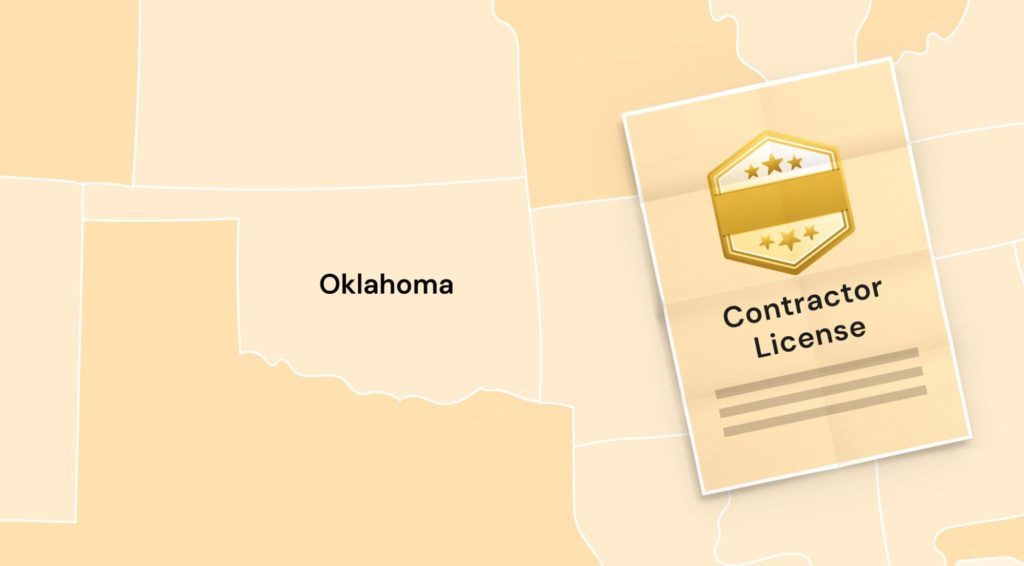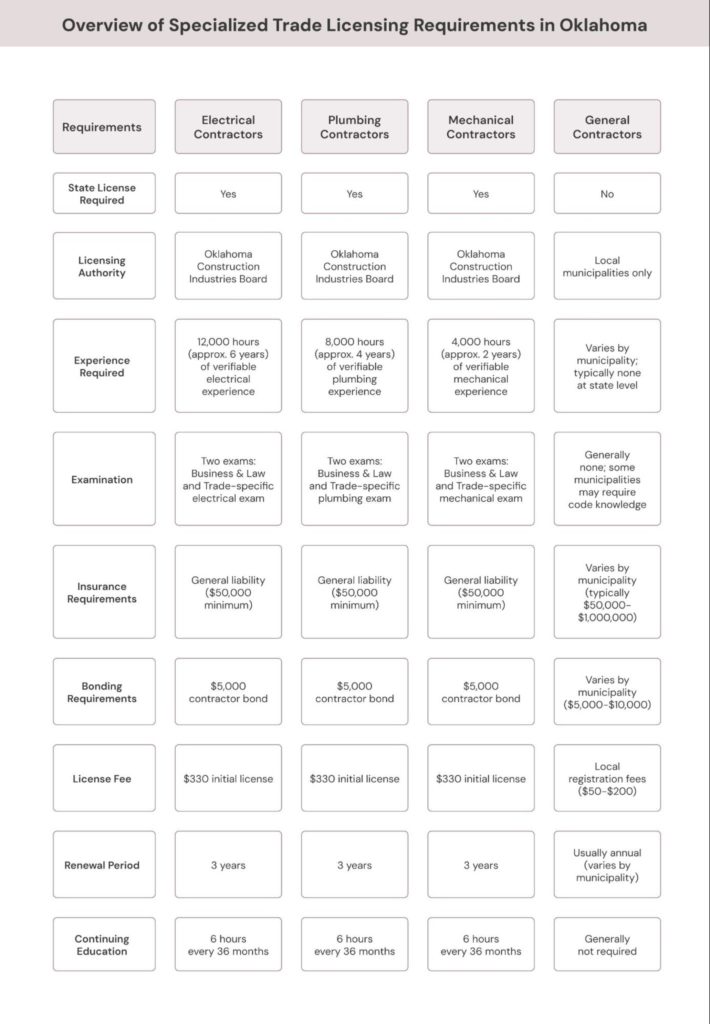Managing various aspects of contractor licensing can feel overwhelming when you are trying to establish or expand your construction business in the state of Oklahoma. A proper contractor license serves as your foundation for building a reputable construction business that clients can trust.
The contractor’s license shows your commitment to quality workmanship and adherence to industry standards, providing potential clients with the confidence to choose your services over those of unlicensed competitors. Oklahoma stands apart from many states with its unique approach to contractor regulation. Unlike neighboring states that enforce strict statewide licensing programs, Oklahoma delegates regulatory authority to local municipalities.
This decentralized system creates a varied ecosystem where requirements differ significantly from Oklahoma City to Tulsa to Norman. You need to understand the specific requirements in each jurisdiction where you plan to work. This guide takes you through the essential steps to navigate Oklahoma’s contractor licensing framework correctly.
State vs. Local Licensing Requirements in Oklahoma
Oklahoma’s contractor licensing framework creates a regulatory system that varies significantly based on your location and the type of work.
- No Statewide Requirement: Unlike many neighboring states, Oklahoma general contractors need not obtain a state-issued license for standard construction projects. The Construction Industries Board officially confirms this unique approach, allowing general contractors to operate without state-level certification for most construction activities.
- Specialized Trades Licensing: While general contractors enjoy regulatory flexibility, specialized trade contractors face stricter oversight. Electrical contractors, plumbing contractors, mechanical, and roofing professionals must secure appropriate state-issued licenses through the Construction Industries Board. These specialized licenses typically require documented work experience, passing technical examinations, and maintaining proper insurance and bonding.
- Local Authority Oversight: Oklahoma’s decentralized approach gives local jurisdictions significant regulatory powers. Each municipality can establish its own contractor registration processes, permit requirements, and compliance standards. For example, Oklahoma City requires contractors to register and pay a $100 fee before obtaining building permits, while Tulsa mandates registration with the Tulsa Permit Center.
 What Are the Steps to Becoming a Licensed Contractor in Oklahoma?
What Are the Steps to Becoming a Licensed Contractor in Oklahoma?
There is no general contractor license application or registration requirement in Oklahoma. Establishing yourself as a legally operating general contractor in the state involves the following crucial steps:
Step 1: Research Local Regulations
Your first critical task involves contacting local building departments and municipal offices in the areas where you plan to operate.
Contact the permit offices in different cities across the state to learn their specific Oklahoma contractor license processes:
Each municipality maintains different requirements, and failing to comply with local regulations can result in significant penalties, project delays, or business interruptions. This includes rules that may restrict construction activities in certain areas, local building codes that dictate construction methods and materials, and permit procedures that specify documentation requirements.
Step 2: Obtain Necessary Permits and Registrations
Register your business formally with the Oklahoma Secretary of State to establish its legal existence. The registration process differs based on your business structure and provides official recognition of your business identity.
This formal registration allows you to operate legally, open business bank accounts, and enter into contracts under your business name.
- Apply for an Employer Identification Number (EIN) from the Internal Revenue Service to manage tax responsibilities by following these steps:
- Determine eligibility to apply for an EIN
- Identify your business structure or entity type
- Gather required details like name, address, SSN
- Visit the official IRS EIN application webpage
- Select “Apply for an EIN” to begin application
- Follow on-screen prompts and enter business information
- Submit application and receive EIN immediately online
The EIN functions as your business’s tax identification number and remains
essential, even if you initially operate without employees.
- Open a business account with a bank by providing your unique Employer Identification Number (EIN). This number facilitates a clear separation between personal and business finances for accurate accounting and tax reporting.
- Obtain the necessary local building permits before commencing any construction project. These permits, which vary by jurisdiction, typically require the submission of project plans, proof of insurance, and payment of applicable fees.
Step 3: Secure Insurance and Bonding
Obtain comprehensive general liability insurance that protects your business against property damage and injury claims. Many municipalities require minimum coverage amounts; for instance, Oklahoma City mandates at least $50,000 in general liability insurance, and clients often verify insurance coverage before awarding contracts. The CIB requires all applicants to provide proof of general liability and worker’s compensation insurance.
Consider securing a surety bond when operating in municipalities with bonding requirements. While Oklahoma does not mandate statewide bonding for general contractors, cities like Tulsa, Oklahoma City, and Enid often require contractor bonds ranging from $5,000 to $10,000. These bonds protect clients financially by guaranteeing project completion in accordance with contractual terms and providing compensation if the work fails to meet agreed-upon standards.
Step 4: Comply with Workers’ Compensation Requirements
Workers’ compensation insurance is mandatory for Oklahoma contractors who employ workers, with significant implications for your business:
- Oklahoma law requires you to carry workers’ compensation insurance for all employees regardless of their full-time, part-time, or temporary status, with minimal exceptions for small family businesses.
- This insurance provides essential coverage for medical expenses related to workplace injuries and offers wage replacement during recovery periods for your injured employees.
- Workers’ compensation provides death benefits to families of employees killed on job sites, reducing your exposure to wrongful death lawsuits.
- Failing to maintain proper coverage can result in fines up to $10,000, project shutdowns, and personal liability for employee medical expenses and lost wages.
Step 5: Stay Informed and Compliant
Groups like the Oklahoma Home Builders Association and Associated General Contractors of Oklahoma offer regular seminars, certification programs, and networking opportunities that enhance your technical knowledge and business management skills while building valuable professional connections.
- Implement a systematic approach to tracking and renewing licenses, permits, insurance policies, and business registrations.
- Many local registrations require annual renewal, and insurance policies typically need regular updates to maintain adequate coverage as your business grows.
- Creating a compliance calendar with automatic reminders will help you avoid operational disruptions from expired credentials.
Important Resources for Oklahoma Contractor Licensing
| Organization/Resource | Purpose | Website URL |
| Municipal Building Departments | ||
| Oklahoma City Development Services | Building permits, contractor registration | www.okc.gov/business/building-permits |
| Tulsa Permit Center | Building permits, contractor registration | www.cityoftulsa.org/permitting |
| Norman Development Services | Building permits, contractor information | www.normanok.gov/businesses/builders-contractors |
| Lawton License & Permits Division | Building permits, business licensing | www.lawtonok.gov/business/license-and-permits |
| Lawton Civic Access Portal | Online permit applications | www.lawtonok.gov/departments/community-services/building-division |
| State Regulatory Agencies | ||
| Oklahoma Construction Industries Board | Trade licensing (electrical, plumbing, mechanical) | oklahoma.gov/cib.html |
| CIB License Verification | Verify licenses for trade contractors | cibverify.ok.gov |
| Oklahoma Secretary of State | Business registration | www.sos.ok.gov/business/default.aspx |
| Oklahoma Business Hub | Business registration information | oklahoma.gov/business/launch/register-your-business.html |
| Industry Associations | ||
| Oklahoma Home Builders Association | Industry support, education, networking | www.okhba.org |
| Associated General Contractors of Oklahoma | Industry support, education, advocacy | www.agcok.com |
| Federal Resources | ||
| Internal Revenue Service | Apply for Employer Identification Number (EIN) | www.irs.gov |
How Does Specialized Trade Licensing Work in Oklahoma?
While general contractors operate without state licenses, specialized trade professionals must navigate structured licensing processes through Oklahoma’s regulatory agencies.
- Electrical, Plumbing, and Mechanical Trades: The Construction Industries Board administers licensing for these specialized trades with stringent requirements.
- Electrical contractors must document 12,000 hours of on-the-job experience
- Plumbing and mechanical contractors need four years of experience
- Each trade requires passing required exams covering code knowledge, safety protocols, and installation practices before obtaining licenses.
- State Board Oversight: The Construction Industries Board enforces licensing standards and regulates trade practitioners through dedicated committees for each specialty. These regulatory bodies investigate complaints, conduct site inspections, and enforce compliance with the latest building codes and safety standards. Trade contractors must maintain current documentation showing active license, certificate of insurance, and completed continuing education requirements to meet board standards.
What Are the Key Requirements for Maintaining Contractor Licenses in Oklahoma?
Maintaining your contractor status requires ongoing attention to the following compliance elements:
- Timely Renewals: Specialized trade licenses typically require renewal every three years through the Construction Industries Board. Most local contractor registrations follow annual renewal cycles with specific deadlines and fee schedules. Missing renewal deadlines can result in additional late fees, reinstatement costs, or requirements to reapply entirely for lapsed credentials.
- Continuing Education: Specialized trade contractors must complete 6-hours of approved continuing education every 36 months before license renewal. The Construction Industries Board publishes lists of approved courses covering code updates, safety procedures, and industry advancements. Some classes offer online completion options for busy contractors who need flexibility in fulfilling these requirements.
- Regulatory Updates: Construction codes and local ordinances undergo regular revisions that directly impact your business operations. Municipal building departments frequently update permit requirements, inspection protocols, and zoning regulations that affect construction projects. Subscribing to industry newsletters, attending local contractor meetings, and maintaining relationships with code officials helps you anticipate and prepare for these regulatory changes.
What Are the Benefits of Proper Licensing for General Contractors in Oklahoma?
Maintaining appropriate licensing and registration credentials provides significant advantages beyond basic legal compliance.
- Legal Protection: Proper licensing safeguards your contracting business against regulatory penalties that can disrupt projects and harm your reputation. Cities like Oklahoma City regularly conduct job site inspections and can issue stop-work orders, substantial fines, and even criminal charges for contractors operating without required registrations.
- Enhanced Client Trust: Licensed contractors demonstrate commitment to professional standards that savvy clients recognize and value. Your proper registration status serves as third-party validation of your legitimacy, encouraging clients to choose your services over unregistered competitors who might cut corners on quality or safety.
- Project Access: Municipal construction projects, commercial developments, and larger residential jobs typically require contractors to provide proof of proper licensing. Oklahoma government contracts specifically mandate current registration documentation, bonding verification, and insurance certificates before contractors can submit bids or secure project awards.
How to Overcome Common Challenges?
Oklahoma contractors frequently encounter the following obstacles while navigating the decentralized licensing system in the state:
- Managing Multiple Licenses: Implement digital credential management systems that store registration documents, track renewal dates, and automate reminder notifications. Applications like Todoist, Asana, or industry-specific tools such as BuilderTREND help organize licensing paperwork across multiple jurisdictions and prevent costly lapses in compliance status.
- Balancing Education with Business: Prioritize off-season months for completing required continuing education courses when project demands typically decrease. Many approved education providers now offer evening classes, weekend seminars, and on-demand online modules that accommodate busy contractors while fulfilling Construction Industries Board requirements.
- Navigating Varying Regulations: Develop municipality-specific compliance checklists that outline exact requirements for each jurisdiction where you operate. Creating standardized documentation packets for each city streamlines the registration process and ensures you consistently meet all local requirements without overlooking critical details.
Conclusion
Oklahoma’s unique approach to contractor regulation creates both opportunities and challenges for construction professionals. The absence of state-level licensing for general contractors offers easier market entry, while the patchwork of local requirements demands careful attention to compliance details in each jurisdiction where you operate.
Your success depends on following a systematic approach around researching local regulations, securing proper business registration, obtaining necessary insurance, and establishing systems for maintaining credentials.
About Foyr
Foyr’s innovative design software enables contractors to create stunning 3D visualizations that communicate concepts clearly before breaking ground, enhancing client confidence in your capabilities.
With Foyr Neo, you can develop impressive client presentations without specialized design training, using features like drag-and-drop functionality and one-click rendering.
Sign up for a 14-day free trial and discover how this intuitive platform can help you transform project presentations, reduce revision cycles, and win more bids through compelling visual storytelling.



 What Are the Steps to Becoming a Licensed Contractor in Oklahoma?
What Are the Steps to Becoming a Licensed Contractor in Oklahoma?




